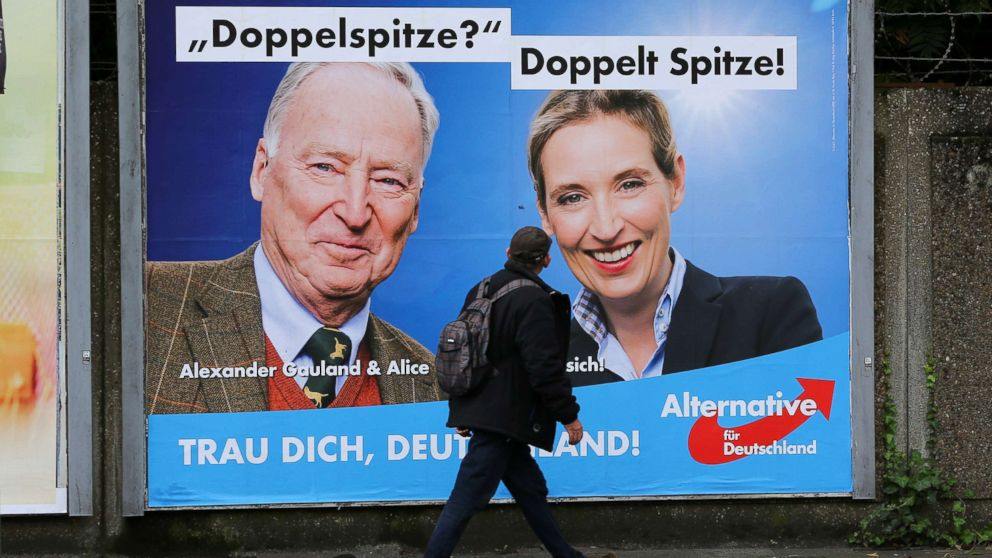The German political party Alternative for Germany (AfD) was expelled on Thursday from Identity and Democracy (ID), a right-wing nationalist coalition in the European Parliament, following remarks from the party’s leading candidate for the European Union elections in early June regarding the Schutzstaffel (SS).
Another Loss for the AfD
The expulsion followed an interview with Maximilian Krah, a former MEP for the AfD and leading candidate in the upcoming EU elections, by an Italian newspaper, La Repubblica, in which the politician stated that the Waffen SS were “not all criminals,” citing the life of Gunter Grass, an author and winner of the Nobel Prize in Literature who revealed in an autobiography that he was a member of the SS. Krah further claimed that many of those serving with the SS were “peasants,” before stating that the politician “would never say that anyone who wore an SS uniform was automatically a criminal.”
Critics argue this statement has cast further doubt on the beliefs of the AfD after another politician, Bjorn Hocke, was found guilty of using a phrase commonly used by the Nazi paramilitary group Sturmabteilung (Storm Division) and making common appearances on the group’s daggers and other paraphernalia.
Despite ID removing the AfD from their coalition, Alice Weidel, one of the party’s co-leaders, has stated that she remains confident in the party’s chances to secure votes for the European Parliament in Germany, further expressing her confidence in securing an alliance with parties in the EU.

Following the announcement of the expulsion, the AfD reportedly petitioned ID to focus their expulsion solely on Krah, Reuters reports. “We see this as the last (albeit desperate!) attempt to prevent the exclusion of the entire AfD delegation from the ID parliamentary group,” MEP Christine Anderson wrote in a letter, according to Reuters.
“The AfD is going from one provocation to the next,” Marine Le Pen, a French politician who confirmed ID’s parting with the AfD following the statements, stated before claiming that the party is “clearly controlled by radical groups.”
This is not the first time a figure has made the claim that the AfD is controlled by radical elements. An investigation launched into the party by Germany’s Federal Office for the Protection of the Constitution (BfV) concluded that the AfD was a “suspected right-wing extremist group” following revelations that the party had become “increasingly radicalized.” The AfD would challenge these claims in court, culminating in a months-long court case in which critics claim the party sought to delay until after the EU elections, which ultimately saw the ruling upheld.

The AfD has seen a hit in opinion polls conducted by Politico; the party previously stood at 22% in January, placing themselves as the second most popular party in Germany. Now, however, the party stands at a mere 16%, putting the AfD neck and neck with the Social Democratic Party of Germany (SPD), which also stands at around 16%.
This drop in popularity is largely considered the byproduct of the aforementioned controversies, along with a divisive meeting in November attended by two members of the AfD where attendees allegedly discussed the “remigration” of those “unassimilated” to German culture to their home countries or a newly created state in North Africa, whether they held German passports or not. The meeting, which was leaked by Correctiv, a German investigative journalism outlet, consisted of two members of the AfD, “neo-nazis,” and a number of other political activists.
The Future of the AfD
Polls already show a downward trend for the AfD nationally, with the possibility of the SPD regaining their position as Germany’s second-most popular party and quickly closing in on the populist AfD.
These controversies, along with what many believe to be extremism from the AfD, have led some to suggest banning the political party in order to protect the democratic process in Germany. Such a ban would have to undergo an extensive court case and investigation by authorities. Hocke’s ruling, however, may grant the process further credibility, offering a chance of a party ban.
In order to ban a political party in Germany, a case would have to first be requested by either the Bundestag (the German federal governing body) or the Bundesrat (the federal representation of the sixteen German states). The German Federal Office for the Protection of the Constitution (BfV) would then have to prove that the AfD actively seeks to end the democratic process in Germany.

“At this point, a procedure to ban the party would still have to identify an element that is actively militant, in other words, that acts according to a plan,” the President of the Thuringian BfV, Stephan Kramer, stated. “For this to happen, it is not necessary that any crimes have been committed.”
Others have condemned this idea, with some claiming such a ban would only further the party’s support, especially due to the AfD’s claims that they are the target of a concerted government effort to remove an opposition party from running for office.
“The establishment of this state—and that includes the BfV and the media—is being used to exclude us from democratic competition,” Weidel stated following the Monday ruling.
“You can’t simply ban a party that gets 20–30 percent approval,” Volker Boehme-Nessler, a political scientist, told the eastern German broadcaster MDR, which broadcasts for the federal states of Saxony, Saxony-Anhalt, and most notably Thuringia, where the party has achieved most of its success.


